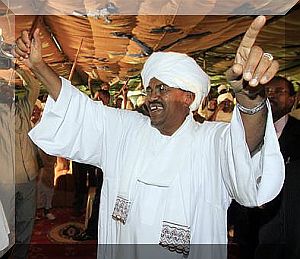Sudan Elections: Democracy at Last ?

 |
| Sudan's President Elect Omar Bashir Photo courtesy |
Elections as a fundamental or instrumental right
In analyzing election outcome and the prospects for democracy in
Democracy in depth / Democracy in theory
By the same token, political parties can distinguish between democracy as means and democracy as goals. The most fundamental of the goals of democracy are probably four in number. Firstly, to make rulers accountable and answerable for their actions and policies. Secondly, to make citizens effective participants in choosing rulers and regulating their actions. Thirdly, to make the society as open and the economy as transparent as possible; and fourthly, to make the social order fundamentally just and equitable to the greatest number possible. Accountable rulers, actively participating citizens, an open society with a transparent economy, and social justice: those are the four fundamental ends of democracy (Roland N. Stromberg, 1996).
In order to achieve these goals, citizens must make their rulers more accountable. The U.S.A., for example, has chosen separation of powers and checks and balances; whilst the
General governance in
One component of good governance is rule of law, specifically during elections. Again, in the U.S.A, the law is on the side of the open society (Lois G. Forer). On the other hand, in Sudan and much of the rest of
In
Democracy in
The question, then is, what does democracy mean to Sudanese voters? African leaders inherited democracy from colonial masters without understanding the concept behind it. In essence, democracy, as applied in
It is not the visible process of democracy that will bring success overnight, but rather a host of behind the scenes and necessary development projects and initiatives on the ground, that will lead
The third dimension of democracy is stability: which is a social-political precondition for both sustainable development and durable democracy.
Democracy suffered greatly in
The three horsemen
Election rigging and other vote frauds, such as the ones allegedly taking place in Central Equatorial, Unity
Each of these three suspects in the election rigging game has had a hand in unfair elections, and indeed, has contributed to the death of democracy in
Finally, the SPLM harassment of independent candidates, and directives and orders handed down to ban the activities of SPLM-DC, are an added false start to the work of democratization in
The way forward
In the final analysis, this unfair election may cause more harm than good to both SPLM, and NCP as CPA partners, and the road to independence for South Sudan through the upcoming referendum in 2011, will be that much more difficult.
From the indicators on the ground, most Southern Sudanese Citizens are in favour of separation under the SPLM; and the North is trying its utmost best to make continued unity attractive at all costs. The only and final voices on the status and prospects for democracy in Sudan are the Sudanese people, who have remained oppressed for 25 years and would very much like to see change from a one party state to multi-party rule; all through good governance and its key components of fair, free, transparent, credible and inclusive elections; accountability and legitimacy in governance; and, the rule of law.
Kenya election was a litmus test but sadly African governments failed to learn from election riggings and frauds such as those that occurred in
What should be done regarding rigging votes? The first step is that the NEC should resolve disputes over election results through a disputes and complaints committee. The results must be reviewed, with options put on the table including a recount (in Terekeka, Bentiu, and Wau) to satisfy stakeholders’ confidence in the NEC.
Finally, the way ahead is creation of a multi-national state thus must ascribe to the principles of equality, acceptance, respect, freedom, separation of religion from state, peace and reconciliation initiatives, need for the creation of national consciousness and of an awareness of common values, sense of responsibility for the country’s other cultures, and the law-enforcement against culture of corruption, tribalism, ethnic nepotism, and ethnic favouritism.
By Justin Laku
